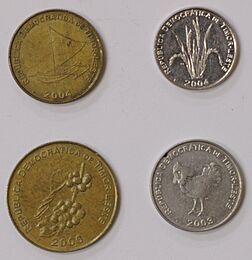East Timor centavo coins facts for kids
Quick facts for kids East Timor centavo coins |
|||
|---|---|---|---|
|
|||
| User(s) | (alongside the U.S. dollar) |
||
| Pegged with | United States dollar (at 1:100 ratio) | ||
| Superunit | |||
| 100 | United States dollar | ||
| Coins | 1, 5, 10, 25, 50, 100 and 200 centavos | ||
| Banknotes | not yet issued1 | ||
| 1 East Timor also uses U.S. dollar notes. | |||
The East Timor centavo coins are special coins used in East Timor, a country in Southeast Asia. These coins were first introduced in 2003. They are used alongside U.S. dollar paper money and coins. Before 2000, East Timor used the Indonesian rupiah. After the U.N. helped East Timor become independent, the U.S. dollar became the main currency.
One centavo coin is worth the same as one U.S. cent. The coins you can find for everyday use are 1, 5, 10, 25, and 50 centavos. These coins show pictures of local plants and animals. Later, bigger coins were made: a 100 centavos coin in 2013 and a 200 centavos coin in 2017. These larger coins are worth the same as one U.S. dollar and two U.S. dollars, respectively. They were created to save money because it costs a lot to keep replacing worn-out U.S. dollar bills. As of 2024, East Timor does not print its own paper money; they use U.S. dollar banknotes instead.
The centavo coins are made in Lisbon, the capital city of Portugal. They are minted by a special company called Imprensa Nacional-Casa da Moeda, which is Portugal's national mint. Unlike some other countries that use U.S. dollars (like Panama or Ecuador), East Timor's coins are not the same size as U.S. cents.
Meet the East Timor Centavo Coins
Each East Timor centavo coin has two sides:
- The obverse side (front) shows the coin's value, the word "centavo" or "centavos," a traditional symbol called a kaibauk, and a pattern from a special East Timorese fabric called tais.
- The reverse side (back) shows different pictures, the country's name, and the year the coin was made.
Let's look at the different coins:
| East Timor centavo coins | |||||||
|---|---|---|---|---|---|---|---|
| Image | Value | Coin Details | What's on It? | ||||
| Reverse | Obverse | Size (Diameter) | Material | Weight | Reverse Side | Obverse Side | |
 |
1 centavo | 17 mm | Nickel-coated steel | 3.1 g | A Nautilus shell, the country's name, and the year. | The coin's value, the word "centavo" or "centavos," a kaibauk symbol, and a tais pattern. | |
 |
5 centavos | 18.75 mm | 4.1 g | A Rice plant, the country's name, and the year. | |||
 |
10 centavos | 20.75 mm | 5.2 g | A Fighting rooster, the country's name, and the year. | |||
 |
25 centavos | 21.25 mm | Nickel-brass | 5.85 g | A traditional fishing boat called a beiro, the country's name, and the year. | ||
 |
50 centavos | 25 mm | 6.5 g | Coffee beans, the country's name, and the year. | |||
 |
100 centavos | 23.75 mm | Nickel-brass ring with a cupronickel center | 7.25 g | A picture of Boaventura de Manufahi, an important historical figure; the country's name, and the year. | ||
 |
200 centavos | 25.5 mm | Cupronickel ring with a brass center | 8.46 g | A Swamp buffalo in a rice paddy field with the Matebian mountain in the background; the country's name, and the year. | ||
See also
- Centavo – Learn more about centavo coins used around the world.
- Economy of East Timor – Discover more about how East Timor's economy works.
 | James B. Knighten |
 | Azellia White |
 | Willa Brown |


